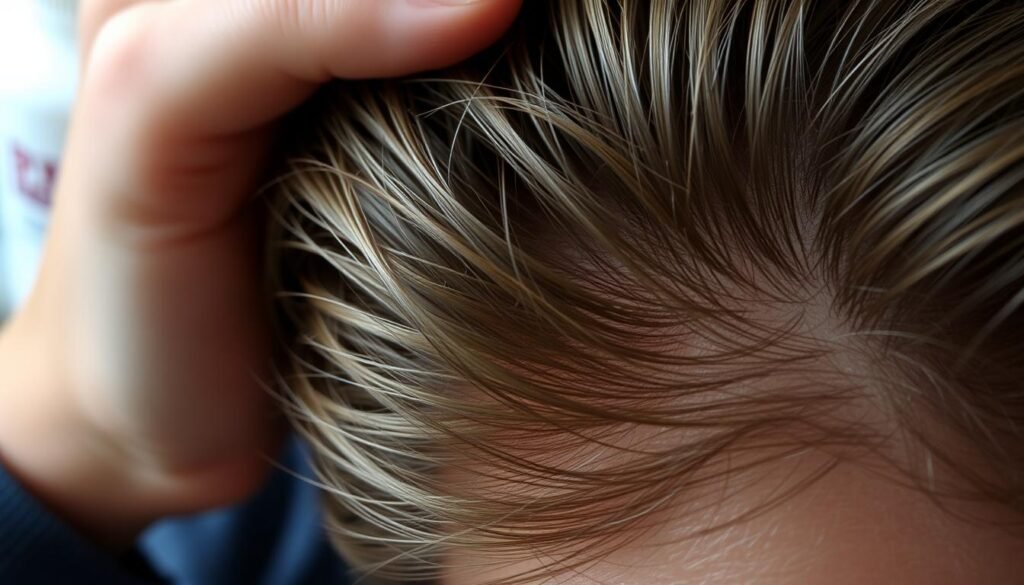About 30% of people using TNF-alpha inhibitors like Remicade report hair loss during treatment. Although hair loss isn’t a common side effect, the link between Remicade and hair health worries many. It’s key to know about Remicade’s side effects, especially for those who care about their hair while dealing with diseases like ulcerative colitis, Crohn’s disease, and rheumatoid arthritis.
This article will look into Remicade’s effects, focusing on hair loss, and offer ways to handle these issues. By looking at clinical studies, patient stories, and expert advice, you’ll understand Remicade’s impact on hair and how to tackle any problems.
Key Takeaways
- Remicade is used to treat autoimmune conditions but may have some side effects, including hair loss.
- Understanding the connection between Remicade and hair health is important for patients.
- Monitoring side effects, especially in long-term treatment, is crucial for overall health.
- Hair loss may be associated with other conditions treated by Remicade, like psoriasis.
- Consulting a healthcare professional can help manage and address concerns about hair loss.
- Patients are encouraged to share their experiences and symptoms with their doctors.
- Staying informed about the potential risks and benefits of Remicade is essential.
Understanding Remicade
Remicade, also known as infliximab, treats many autoimmune diseases. It works by slowing down an inflammation-causing protein called TNF-alpha. This role is crucial for managing diseases like Crohn’s disease, ulcerative colitis, rheumatoid arthritis, and plaque psoriasis. It’s important to know about possible side effects, including hair thinning and shedding.
What is Remicade?
Remicade is a monoclonal antibody that targets TNF-alpha in the body. By doing this, it can fight chronic inflammation. It is recommended for several conditions, such as:
- Rheumatoid arthritis with active disease
- Moderately to severely active Crohn’s disease in adults
- Severe, active Crohn’s disease in children and adolescents aged 6 to 17 years
- Moderately to severely active ulcerative colitis in adults
- Severely active ulcerative colitis in children and adolescents aged 6 to 17 years
- Severe, active ankylosing spondylitis in adults
- Active and progressive psoriatic arthritis in adults
- Moderate to severe plaque psoriasis in adults
How is Remicade Administered?
Remicade is given through an IV infusion by healthcare workers. Treatment plans differ based on your health issue. For example:
- Rheumatoid arthritis: You start with a dose of 3 mg/kg. Next doses come at 2 and 6 weeks, then every 8 weeks.
- Crohn’s disease: Your first dose is 5 mg/kg. If there’s no improvement, another dose follows in 2 weeks.
- Ulcerative colitis: Treatment begins with 5 mg/kg. Additional doses are at 2 and 6 weeks, then every 8 weeks.
- Ankylosing spondylitis and other diseases have their own dosing schedules.
With IV therapy, medical teams watch for any side effects. They keep an eye out for hair thinning or shedding.
How Remicade Works in the Body
Understanding Remicade’s role helps explain its benefits and possible side effects, like hair loss. It’s key in treating autoimmune diseases by focusing on certain inflammation. This insight offers a clear view of how it works.
Mechanism of Action
Remicade works by stopping tumor necrosis factor-alpha (TNF-alpha), a cytokine causing inflammation. By blocking TNF-alpha, it lowers inflammation and changes the course of autoimmune diseases. This action offers relief from diseases like Crohn’s and rheumatoid arthritis.
Conditions Treated by Remicade
Remicade is approved for various autoimmune conditions:
- Crohn’s disease
- Ulcerative colitis
- Rheumatoid arthritis
- Ankylosing spondylitis
- Psoriatic arthritis
- Plaque psoriasis
This shows Remicade’s critical role in treating severe inflammatory issues. It also brings up the possible side effect of hair loss. Knowing this helps healthcare workers set the right expectations with patients.

| Condition | Remicade Effects |
|---|---|
| Crohn’s Disease | Decreases inflammation, reduces symptoms |
| Ulcerative Colitis | Improves mucosal healing, alleviates symptoms |
| Rheumatoid Arthritis | Reduces joint inflammation and pain |
| Ankylosing Spondylitis | Improves spinal mobility, decreases pain |
| Psoriatic Arthritis | Lessens joint and skin symptoms |
| Plaque Psoriasis | Reduces plaque formation, improves skin surface |
The table shows how Remicade helps with different conditions, highlighting its value and the need to know about side effects. Understanding all aspects is crucial for anyone on or considering Remicade.
Possible Side Effects of Remicade
It’s critical to know the possible side effects if you’re considering or already on Remicade. While most handle it well, knowing the risks helps in early detection and quick response.
Mild Side Effects
Many experience mild side effects with Remicade. These usually go away after a few days. Some common ones are:
- Headaches
- Infections, such as the common cold or urinary tract infections
- Infusion-related side effects, including flushing and rash
- Abdominal pain
- Joint pain
These side effects, while annoying, are often not serious. Still, talking with your doctor about any new symptoms is key.
Serious Side Effects
Severe side effects from Remicade are uncommon but require urgent care. There are serious risks that need monitoring:
- Increased risk of serious infections, such as tuberculosis (TB), which may reactivate in some patients
- Cancers reported in clinical studies, requiring careful monitoring
- Liver damage, potentially leading to conditions like liver failure or hepatitis
- Heart failure and other cardiovascular complications
- Nervous system conditions, including lupus-like syndrome
- Allergic reactions that could range from mild to severe
Kids might react differently to Remicade than adults. Knowing about severe side effects is vital for keeping in touch with your doctor, ensuring better health management.

| Type of Side Effect | Description | Severity |
|---|---|---|
| Mild | Headaches, cold infections, infusion-related symptoms | Common |
| Serious | Risk of infections, cancers, liver damage | Rare |
Staying informed about Remicade’s risks is essential for taking care of your health. Regular check-ups and chatting with your doctor can help reduce risks significantly.
Does Remicade Cause Hair Loss?
Patients and doctors are both interested in how Remicade may cause hair loss. There’s a shortage of clinical studies linking Remicade to hair loss, but some stories suggest it could lead to hair falling out. This hair loss, known as telogen effluvium, may start around three months after beginning treatment with drugs like Remicade.
Clinical Studies and Reports
Around 10% of people using certain medications report losing hair. Hair loss with Remicade is thought to be part of this wider issue. A study from 2015 found hair loss to be a top side effect of epilepsy drugs, just behind weight loss. Figuring out these side effects is tough and depends on the whole treatment plan of a patient. To learn more about medication and hair loss, click this link.
Comparison with Other TNF-alpha Inhibitors
Reports suggest that hair loss might be more common with other TNF-alpha inhibitors, like Humira, compared to Remicade. This raises the importance of more research to understand these effects better. Drugs for severe acne and psoriasis can also cause hair to thin because they affect hair growth. Knowing about these effects helps us realize how medications can influence hair health.
Remicade Hair Loss: Connection with Other Conditions
The link between Remicade and skin issues like psoriasis matters a lot for hair health. It’s vital to know how they affect each other, especially for those losing hair during Remicade treatment. Psoriasis on the scalp can lead to hair loss because it fights inflammation. Remicade and other treatments for psoriasis might cause alopecia, a hair loss condition.
Impact of Psoriasis on Hair Health
People with psoriasis on their scalp usually see their hair health go downhill. Ongoing inflammation and skin flaking change the hair’s growth cycle, leading to:
- Slowed hair growth, making hair take longer to grow back.
- Increased hair shedding with stress and flare-ups.
- Nutritional deficiencies from psoriasis affect hair’s health and growth.
Managing psoriasis well is key to keeping hair healthy while on Remicade.
Alopecia and Its Association with Remicade
Alopecia, meaning hair loss, can happen with Remicade treatment. What we know shows:
- Remicade and similar drugs often lead to hair loss as a side effect.
- About 33% of people with inflammatory bowel disease (IBD) report losing hair, showing a link.
- IBD flare-ups stress can make hair loss worse, raising alopecia risks.
To fight hair loss from Remicade, focusing on overall health, diet, and stress is crucial. Working together, patients and doctors can pinpoint hair loss causes and customize treatments.

Managing Hair Loss While on Remicade
Undergoing Remicade treatment often means dealing with hair loss. It’s crucial for one’s health and happiness. Luckily, there are ways to fight hair thinning and keep hair healthy. By understanding different treatments and good hair care, you can prevent hair loss from Remicade.
Potential Treatments for Hair Thinning
Several options exist for those losing hair due to Remicade. These include:
- Topical treatments: Minoxidil products can help hair grow back. They’re widely used for different hair loss scenarios.
- Dietary supplements: Nutrients like biotin, zinc, and iron support hair health. Supplements can fix deficiencies causing hair loss.
- Medication adjustments: Talking to a doctor about changing meds can be key in controlling hair loss from Remicade.
- Corticosteroid injections: For conditions like alopecia areata, doctors might use steroids to get hair growing again.
Tips to Maintain Healthy Hair
Healthy hair care habits are also crucial:
- Avoid harsh hair products that can harm hair roots.
- Eat a balanced diet full of vitamins and minerals for your hair.
- Use stress-relief strategies, since stress might make hair loss worse.
- Drink plenty of water to stay healthy and keep your hair vibrant.
Testimonies from Patients on Remicade
People taking Remicade have shared their experiences with hair loss. They talk about how it affects them physically and mentally. These remicade hair loss testimonies offer insights into dealing with these issues.
Personal Experiences with Hair Loss
A patient noticed her hair beginning to fall out in May 2011. She believed Remicade and stress from Crohn’s disease played roles. Many describe hair loss as both a physical and emotional battle. They seek various ways to feel confident again.
Some patients wear wigs, while others try special hair care products. For example, Plantur 39 shampoo and conditioner were praised for helping hair stay strong and thick.
Advice from Others in Similar Situations
Patients often say accepting hair loss is a part of their journey. They suggest experimenting with different wigs to maintain their identity. One person shared how wigs, ranging from blonde to black, helped her express herself.
Other patients emphasize facing hair loss with courage and making smart choices about hair care. Such stories show resilience, offering hope to those in similar situations.
For more stories about dealing with hair loss during treatment, check out Gemma’s experience.
Consulting Your Doctor about Remicade and Hair Loss
When you start Remicade, it’s key to talk openly with your doctor about any concerns. Hair loss is one such concern to bring up. Getting medical advice can help solve these problems well.
When to Talk to Your Physician
Consult your doctor if you see changes in your hair or experience hair loss. Having regular check-ups is important for discussing symptoms. If hair loss happens with treatment, tell your doctor right away.
This step helps decide the best action, like changing medicines or trying other treatments.
Importance of Monitoring Symptoms
It’s critical to keep an eye on Remicade’s side effects for better health. Write down any side effects, like hair loss, to tell your doctor. Detailed records help your doctor choose the right treatment plan.
Talking about lifestyle changes can also manage side effects better. Additionally, looking into natural remedies for hair loss might be useful alongside your doctor’s advice.
| Medication | Potential Hair Loss Percentage | Common Associated Conditions |
|---|---|---|
| Accutane | 10% | Acne |
| Anticoagulants | N/A | Blood Conditions |
| Statins | Rare | Cholesterol Management |
| Remicade | Rare | IBD |
| Methotrexate | Common | Arthritis, IBD |
Conclusion
Remicade and hair loss is a crucial topic that needs thoughtful attention. The link between infliximab and autoimmune issues like alopecia areata is clear from studies. This remicade and hair loss summary shows why patients must watch closely for any side effects during treatment.
Knowing the effects of Remicade therapy helps in getting better treatment results. It’s important to talk to doctors about any new symptoms. Patients can also learn a lot by sharing their stories with others in the same boat.
Finding ways to deal with hair loss is easier when patients and doctors talk openly. You can find a treatment balance that reduces bad effects, keeping you healthy and confident. Taking control of your health on Remicade is empowering.